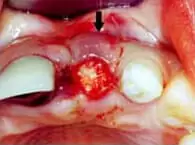A dental implant is a metal post that is inserted surgically into your jaw in place of the original tooth root. It’s a tooth replacement that serves as an alternative to either dentures or dental bridges. Rather than other solutions that sit on the surface of your mouth, dental implants are inserted in place of the original root, making dental implants a more permanent option.
How is it made?
Dental implants are commonly made from titanium, a metal that is not harmful to living tissue and is easily accepted by the body. A metal rod is formed from the titanium and inserted in place of the original root of the tooth. The rod then fuses with the bone and becomes like the original root. The implant serves as a durable foundation for a replacement tooth.
Pros of dental implants
- Longer lasting- other options for teeth replacement often don’t last as long, they can typically last 5-10 years before needing replacing. With proper care, dental implants can last a lifetime.
- Like natural teeth- because dental implants are inserted surgically in place of the original root they act like your natural teeth. So, you can retain your beautiful smile without needing to worry about the sliding that can be common with dentures.
- No cavities- You cannot get cavities in a dental implant. Although it is important to continue to take care of your mouth, have regular checkups with your dentist and keep your gums and mouth clean.
- Protect your natural teeth- Dental implants do not rely on surrounding teeth for support, they are a separate entity like your natural teeth. So, no grinding will occur with your natural teeth as needs to be done to insert a bridge.
- Best thing after your natural teeth- Other tooth replacements can lead to problems with your smile, eating, speaking, and other everyday activities. This is not the case with dental implants, they function and you can treat them as your other teeth.
Dental implants are not commonly covered by insurance, so talk to your insurance provider and your Dr. Silberg before deciding if a they are an option you wish to go with. However, do keep in mind that dental implants are a cost-effective solution as it is a one-time procedure that won’t need to be redone or replaced in the future. Schedule an appointment with The Silberg Center for Dental Science if you are looking for dental implants in Pittsburgh, we can help you decide if they are right for you!








